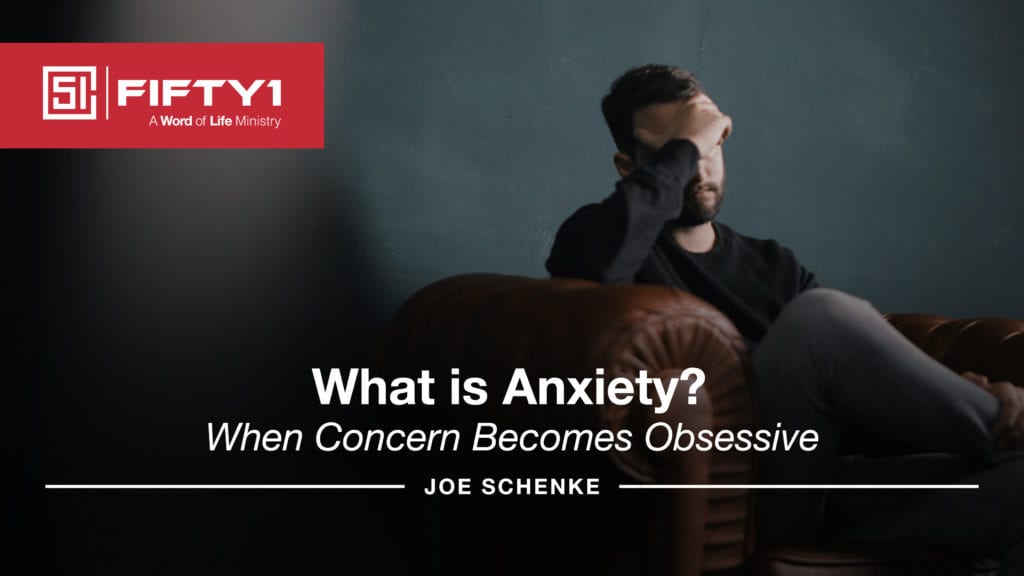INTRODUCTION
Between the COVID-19 pandemic and social upheavals in our society, the impact on mental health has been dramatic. According to the CDC, cases of anxiety and depression have increased considerably.[1] Americans are taking 34% more anxiety medication since the COVID-19 pandemic began.[2]
The need for Christ’s comfort has been acutely apparent. As parents and youth leaders, we share the same fears, frustrations, and isolation as those we counsel, and we need the same Jesus we commend to them.
Over the next four weeks this series will answer one of the following questions:
- What is anxiety?
- What is the nature of anxiety?
- How anxiety is made worse?
- How to offer help?
So what is anxiety?
Anxiety is an emotion. God has designed emotions as an indispensable part of what makes us human. Emotions sometimes function like smoke detectors; they alert us to something so that we are motivated to take action. Anxiety is the anticipation of a future concern and can be a normal reaction that alerts us to dangers or uncertainties in order to help us prepare and take appropriate action. For example, if one feels anxious about an upcoming assignment that’s due, that concern can motivate that person to take the appropriate action to get it done on time. However, feeling too much anxiety about something usually gets in the way and can be unhealthy– or even sinful.
The following chart[3] can help us distinguish between everyday anxiety (concerns) and more problematic anxiety.
| Everyday Anxiety | Problematic Anxiety |
| Worry about paying bills, landing a job, a romantic breakup, or other important life events | Constant and unsubstantiated worry that causes significant distress and interferes with daily life. |
| Embarrassment or self-consciousness in an uncomfortable social situation. | Avoiding social situations for fear of being judged, embarrassed, or humiliated. |
| Nervousness or sweating before a big test, business presentation, stage performance, or other significant events. | Seemingly out-of-the-blue panic attacks and the preoccupation with the fear of having another |
| Realistic fear of a dangerous object, place, or situation. | Irrational fear or avoidance of an object, place, or situation that poses little or no threat of danger |
| Anxiety, sadness, or difficulty sleeping immediately after a traumatic event | Recurring nightmares, flashbacks, or emotional numbing related to a traumatic event that occurred several months or years before |
Succinctly stated: “anxiety is a good emotion – concern – focused on the wrong day – tomorrow. Moreover, sinful anxiety makes improbable predictions of the future.” For example:
- “If I contract COVID I might suffer or die”
- “What if my high-risk loved one gets COVID?”
- “If my political candidate does not get elected the country will . . .”
- “If I can’t see my friends . . .”
These “what ifs” present themselves as certainties, but they are only projections of what might happen in the future. Moreover, this view of the future rarely includes an accurate perspective of God’s mercy and grace that is always present and active. It’s often a hopeless future that leaves God out of the interpretive grid, leaving feelings of angst and despair.
Jesus’ own counsel on this subject gives us great insight:
Therefore do not be anxious for tomorrow for tomorrow will be anxious for itself. Each day has enough trouble of its own. Matthew 6:34
[1]https://www.cdc.gov/mmwr/volumes/69/wr/mm6932a1.htm
[3]https://adaa.org/understanding-anxiety

Schenke is a graduate of WORD OF LIFE Bible Institute and Trinity International University in Deerfield, Illinois. He holds an MA in Biblical Studies from Baptist Bible Seminary and was in the MABC Counseling program at the MASTERS College in Santa Clarita, CA. He has been serving in counseling and pastoral ministry since 1983. Joe is a certified counselor with the Association of Certified Biblical Counselors (ACBC) and currently serves as the Director of Counseling at Word of Life. He and his wife Connie have been married 36 years and have four adult children and 8 grandchildren.

